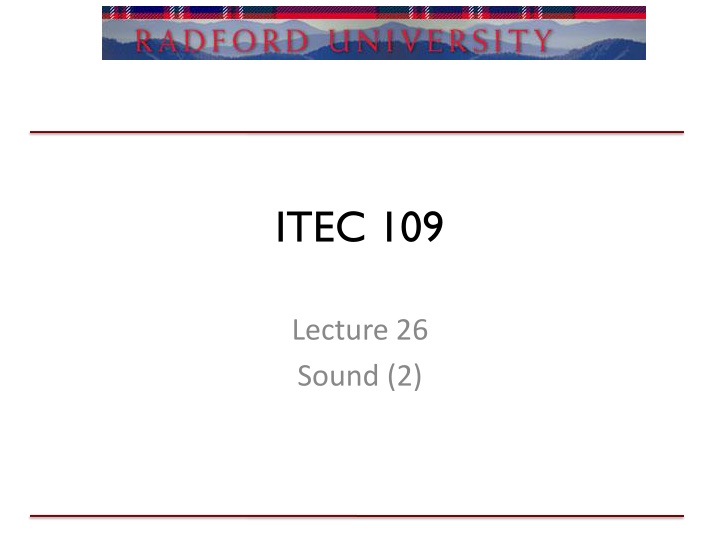
Exploring Sound Manipulation Techniques
Delve into the world of sound manipulation, learning how sound works in real life, different types of sound waves, and creating musical notes on computers. Discover methods for converting, loading, and manipulating sound files, along with creating effects like reversing, echoing, and blending sounds.
Download Presentation

Please find below an Image/Link to download the presentation.
The content on the website is provided AS IS for your information and personal use only. It may not be sold, licensed, or shared on other websites without obtaining consent from the author. If you encounter any issues during the download, it is possible that the publisher has removed the file from their server.
You are allowed to download the files provided on this website for personal or commercial use, subject to the condition that they are used lawfully. All files are the property of their respective owners.
The content on the website is provided AS IS for your information and personal use only. It may not be sold, licensed, or shared on other websites without obtaining consent from the author.
E N D
Presentation Transcript
ITEC 109 Lecture 26 Sound (2)
Review Sound How does it work in real life? What are the different types of waves that represent sounds? How are musical notes played on computers? Sound
Objectives Move beyond simple notes How do you work with Sound
Files Wav files are easy to work with Not everything is wav Need to convert Sound
Conversion Process Find a youtube video Figure out where your temporary internet cache is Find the video in the cache (find the big file) Run it through mplayer mplayer -vo null -ao pcm:fast -ao pcm:file=test.wav Use the wav file as you see fit Sound
Loading a sound Like photos File = /Users/aaray/sound/test.wav sound = makeSound(File); blockingPlay(sound); #Note: play won t allow you to stop it playing Sound
Manipulating volume Increasing Usually doesn t work (clipping) Decreasing Create a background track (30% of original volume) for i in range(0, sound.getLength()): value = getSampleValueAt(sound,i); setSampleValueAt(sound,i, int(value*.3)); Sound
Effects Reverse the sound b = duplicateSound(a); #Create a sound that is the same size c=0; for i in range(a.getLength()-1, 0, -1): setSampleValueAt(b,c, getSampleValueAt(a,i)); c++; blockingPlay(b); Sound
Echo a = duplicateSound(sound); delay = 10000; for i in range(delay, a.getLength()): setSampleValueAt(a,i,int(a.getSampleValueAt(i) + .6*getSampleValueAt(a,i-delay))); blockingPlay(a); Sound
Blending Two sounds to make one base="/Users/aaray/sound/" a = makeSound(base + "testing.wav"); b = makeSound(base + "ooo.wav"); c = duplicateSound(a); for i in range(0, c.getLength()): val1 = getSampleValueAt(a,i)*.5; val2 = getSampleValueAt(b,i)*.5; setSampleValueAt(c,i, int(val1+val2)); blockingPlay(c); Sound
Splicing How would you combine 2 different wav files into 1 wav file What is this called by the average person? How does this relate to arrays? Sound
Chipmunks Double the frequency base="/Users/aaray/sound/" a = makeSound(base + "testing.wav"); b = makeEmptySound(a.getNumSamples()/2+1); c=0; for i in range(0, a.getLength(), 4): setSampleValueAt(b,c, getSampleValueAt(a,i)); c=c+1; blockingPlay(b); Sound
Lengthen it Lower the sound base="/Users/aaray/sound/" a = makeSound(base + "testing.wav"); b = makeEmptySound(a.getNumSamples()*2); c=0; for i in range(0, a.getLength()): setSampleValueAt(b,c, getSampleValueAt(a,i)); setSampleValueAt(b,c+1, getSampleValueAt(a,i)); c=c+2; blockingPlay(b); Sound
Problem Time shifts Songs are half as long Songs are twice as long Why? Easy way out (fits on a ppt slide) The right way Phase vocoder Fast Fourier Transforms (Sophmore->Senior) 500+ Loc just for the math library Sound
Example Audacity Software that does it the right way 38k+ lines of code for handling audio Sound
Other effects Bass boost Fade in / out Speed up / slow down Pop / Hiss removal All possible with array manipulation! Not quite as easy to implement though Sound
Summary More uses for sound Sound
